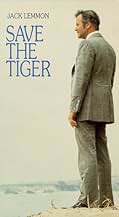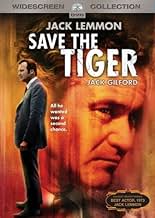Un disilluso veterano di guerra, rimasto indietro con il tempo, ha solamente due giorni per dimenticarsi dei suoi codici morali se vuole far sopravvivere la sua compagnia di moda.Un disilluso veterano di guerra, rimasto indietro con il tempo, ha solamente due giorni per dimenticarsi dei suoi codici morali se vuole far sopravvivere la sua compagnia di moda.Un disilluso veterano di guerra, rimasto indietro con il tempo, ha solamente due giorni per dimenticarsi dei suoi codici morali se vuole far sopravvivere la sua compagnia di moda.
- Regia
- Sceneggiatura
- Star
- Vincitore di 1 Oscar
- 2 vittorie e 5 candidature totali
- Ula
- (as Liv Von Linden)
- Tiger Petitioner
- (as Biff Elliott)
- Model
- (non citato nei titoli originali)
Recensioni in evidenza
Jack Lemmon delivers a brilliant, Oscar-winning performance as Harry Stoner, a middle-aged man at the end of his tether, who confuses his personal midlife crisis, and the failure of his fashion business, with what he sees as the USA's moral decline in the post-war years. Obsessed with the lost cameraderie of his active service in the war, with the baseball and jazz giants of yesteryear, and with the slain and fallen idols of the 60s (Kennedy, King, Monroe etc), he sleepwalks into his own moral abyss of an arson plot, comforting himself that he is no worse than the times in which he lives.
Lemmon's character is countered by those of Phil Greene, his business partner, convincingly played by Jack Gilford, and Meyer (William Hansen), the firm's veteran, expert cutter and refugee from Nazism. Phil does not suffer Harry's sense of disillusion, because he is too down-to- earth to have experienced the illusion in the first place; Meyer, also, despite superficial discontent with the changing times, gains strength from his skill and family life.
For me, the main theme here is the familiar one of the lost American Dream, and the film brings to mind the final lines of the seminal exploration of that theme, the Great Gatsby - "So we beat on, boats against the current, borne back ceaselessly into the past." Harry's American Dream is not of a golden future, but of a golden past; it isn't lost, it simply never existed. But, that said, in this movie thematic analysis definitely takes second place to appreciation of Lemmon's bravura performance.
Harry Stoner (Lemmon) is as an LA businessman who seeks an arsonist to burn him out so he can collect the insurance and rebuild his failing business. His aging partner Phil Greene (Jack Gilford) opposes this, but realizes at his age (close to 65) he may never find another job. Both men are decent but jaded, and troubled by the lost innocence (or false innocence) of their youth in Brooklyn. Harry is also troubled by post-traumatic stress flashbacks from his lost comrades at Anzio in World War II, while Phil is troubled by going along with a crime that means losing his integrity. Both men appear to be Jewish, and may feel added burdens that come with having beaten anti-Semitic discrimination (or worse). There is the also longing for their boyhood in New York, before crime made cities less safe, and before the Dodgers (plus these two men) deserted Brooklyn for Los Angeles - which is not quite the sunny paradise that both probably hoped for. This film also came out in 1973, as Watergate, Vietnam, and the non-success of the Great Society all seemed to evidence a certain national decline.
Save the Tiger is like "Death of Salesman Goes To LA." There is fantasy, failure, and searing struggles for success. The two main characters are not so tragic as Willie Loman; yet they are not all that far removed, either.
The best of these options is to start an arson fire in their factory and hope the insurance payoff will cancel their debts and afford a fresh start. Gilford is against it on moral principles, but Lemmon is a guy who can't afford morals at this stage as George Bernard Shaw once put it.
Still he looks back on his youth and the things and people that moved him back in the day and wonders how he got in the mess he's in. It's not supposed to be like this for people like him who've had ideals and tried to play by the rules.
In his facial expressions, his vocal intonations, in every move of his body and soul, Lemmon becomes Harry Stoner the latest convert to cynicism. It's what got Jack Lemmon his Second Academy Award, this time for Best Actor. Interesting that this very cynical film came out the year that a whole lot of Americans became very cynical as Watergate was unfolding before them.
Arson fire is a tricky business and Lemmon puts himself in the hands of Thayer David who I think gives his best screen portrayal here as the professional arsonist. Listening to him, as creepy as he sounds, he comes off as a man who knows his business. He even at one point offers to return the down payment given him when he explains that insurance will never pay off with all the fire regulation violations Lemmon and Gilford have in their place. It's a business with him and no fatalities must occur, otherwise it's a Law and Order episode.
Jack Lemmon was one of the best around, could do all kinds of comedy and drama with equal skill. Building on the characters he created for Billy Wilder, he's an older man now who's in no position to start from scratch again. Lemmon plays a character that all of us over 40 can definitely relate to.
Save the Tiger is a serious and thought provoking drama about choices each and every one of us could face some time in our lives. It's universality of theme will make it an enduring classic.
I believe the strength of this film is that his performance allows it to strike a multi-generational cord with viewers...a key theme of the movie is the way the world has changed since they way we remembered it when we were younger, which I think is a pang that all of us get, no matter what age. The world always seems darker and more complicated now and concept that needs no real transposition between eras.
Harry Stoner is a man of his times...swing bands, baseball, and World War II. His life is still influenced by all three, but only in quick flashes of fond memories or flashbacks of a beach in Italy. Lemmon gives us a character that does what he has to do in order to maintain what he has worked for, and that rationalizes that which may or may not be quite on the up-and-up.
Jack Gilford is excellent as his partner in Capri Casuals, representing a voice of conscience that is not quite as blind to circumstance as Jack's character, and there are several other good performances in the film. Jack Lemmon stands out, as he does in most films, and richly deserved the Academy Award for this one.
He plays Harry Stoner, owner of an heavily indebted ladies designer clothes manufacturing company. The film covers just 2-3 days of his life and we get a pretty good idea of his sad existence in the urban jungle and what he has become - no longer a good, decent person fighting for the right cause. There are references to Stoner's war record and patriotism throughout the film. The fact that the US was fighting the very unpopular Vietnam war could have influenced the themes of this film.
There is little in the way of plot but there is a rich characterization made deeper by the crises in Stoner's life and Lemmon's excellent depiction of a man who is cracking at the seams. My favorite scenes were the ones in the car with the hippie girl towards the beginning of the film and the question she asked him and Lemmon's comic reaction....
Lo sapevi?
- QuizActor Jack Lemmon waived his usual fee and worked for scale plus a percentage of the gross. Scale was US $165 a week at the time.
- BlooperHarry wipes Fred's face almost completely clean of the red body paint. In a subsequent shot, Fred's face is covered with red paint again.
- Citazioni
Myra: Are you OK? Do you want something?
Harry Stoner: Yes. I want that girl in a Cole Porter song. I wanna see Lena Horne at the Cotton Club - hear Billie Holiday sing fine and mellow - walk in that kind of rain that never washes perfume away. I wanna be in love with something. Anything. Just the idea. A dog, a cat. Anything. Just something.
- ConnessioniFeatured in Paramount Presents (1974)
- Colonne sonoreAir Mail Special
Composed by Jim Mundy, Benny Goodman & Charlie Christian
I più visti
- How long is Save the Tiger?Powered by Alexa
Dettagli
- Data di uscita
- Paese di origine
- Lingue
- Celebre anche come
- Save the Tiger
- Luoghi delle riprese
- Aziende produttrici
- Vedi altri crediti dell’azienda su IMDbPro
Botteghino
- Budget
- 1.000.000 USD (previsto)
Contribuisci a questa pagina


































